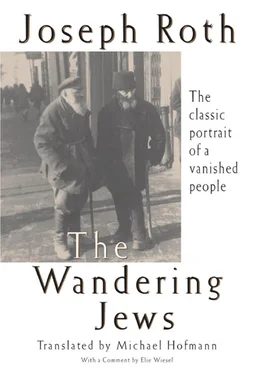5.
Also condemned to wander are those Jews who have remained in Germany. From their small towns, they are forced to move into large towns, and then cities, and when they are booted out of those, back into smaller towns. But even if they manage to remain technically in one place, what inner wanderings they are put through! They wander away from friends, from familiar greetings, from kind words. They shut their eyes to deny what has just happened, which is to wander into a self-willed illusion of night. They wander away from the shock they have just experienced, into fear, which is the older sister of shock, and try to feel comfortable and at ease with fear. They wander into deception, and the worst kind of deception at that — self-deception. And they also wander from one branch of officialdom to the next, from the local police station to the central police headquarters, from the tax inspectorate to the National Socialist Party offices, from the concentration camp back to the police, and from there to the law court, from the law court to prison, from prison to the house of cor rection. The child of German Jews embarks on its extraordinary wanderings at a tender age, going from natural trustingness to suspicion, fear, hatred, and alienation. It sidles into the classroom, past the benches from the front to the back, and even if it has a place, it still has the sensation of wandering. The Jew wanders from one Nuremberg Law to the next,‡ from one newspaper stand to the next, as though in the hope of finding the truth on sale there one day. He wanders toward the dangerous bromide that says: “All things come to an end!” without thinking that he himself is liable to come to an end sooner rather than later. He wanders— staggers, rather — into the fatuous hope: “It won’t be as bad as all that!”—and that hope is nothing but moral corruption.
They stay, and at the same time they wander: It’s a kind of contortionism of which only the most desperate prisoners are capable.
It is the prison of the Jews.
6.
It is worse than Babylonish captivity. Not only may the Jews not bathe on the banks of the Spree, the Elbe, the Main, the Rhine, the Danube, neither may they sit down and weep; they are only allowed to do this in the so-called Kulturbund, the officially sanctioned centerpiece of the new ghetto.
This Kulturbund, however high-minded its inception, is nothing more or less than an unwarranted concession on the part of the Jews to the barbarous theories of National Socialism. Its basis is not the assumption— accepted by so many Jews today — that they are a separate race, but the implicit admission that they are an inferior one. Whereas no one would have dreamed of forbidding some Tibetan, Caucasian, or Japanese Kulturbund to perform Goethe or Beethoven, the Jewish Kulturbund is not allowed to do so. Even when German Jews agree with the National Socialists that they are a distinct people from the Germans (albeit a “guest people” of theirs for a very long time), it is a grave discrimination when these German Jews cannot put on such art. Yet the Kulturbund Jews have simply accepted this discrimination as a given. They were treated not as a minority but as an inferiority . To them it seemed perfectly natural. Their projects, their concerts, their meetings, were supervised by a commissioner, to whom they have to show respect, just as in the dives around Berlin’s Alexanderplatz the “widows’ dances” were once supervised by police commissioners.
Is it correct to speak of a lack of pride on the part of German Jews? I am apt to feel a little sentimental about them, which precludes true empathy. When the subject is the flaws of German Jews, it is not possible to “turn a blind eye.” They might deserve our forbearance but not our blindness. During the pogroms in Kishinev — how much time has passed since Europe was properly Europe, and England told the czar what it today modestly declines to pass on to a former World War One corporal — the Jews fought back. They beat sixty-one Cossacks to death. The Jewish butchers in Hungary opposed the “White” hordes, often putting them to flight. Yet in Germany only a single Jew fired a gun on the day of the “boycott” (and of course, he was put to death).
How does one account for this craven way of responding to so much vileness and treachery? Is it religion? The majority of German Jews paid taxes to the Israelite religious community. Many subscribed to the Hamburg Israelite Family Sheet —and that was about the extent of their commitment to Judaism. (Of course I’m not referring to Zionists and “nationally conscious” Jews here, but to “German citizens of the Jewish faith.”) The names of their brothers who fell for Germany are erased from monuments and memorials — in a two-pronged attack on the dead and the living — they are legally deprived of bread, work, honor, and property, but they button their lips and carry on. No fewer than five hundred thousand people continue to live in this humiliated condition, go out on the peaceful street, take the streetcar and the train, pay their taxes, and write letters: There is no limit to the amount of abuse a man is prepared to take, once he has lost his pride.
German Jews are doubly unhappy: They not only suffer humiliation, they endure it. The ability to endure it is the greater part of their tragedy.
7.
There is no counsel, no consolation, no hope. We need to be clear about the fact that there is no compromising with racism. Millions of plebeians badly need a few hundred thousand wretched Jews to confirm their own superiority. The Hohenzollerns (and with them the whole of German aristocracy) have already kowtowed to the janitors. What can a Jew expect? The masses are unappeasable enough when they gang up and follow their own lawless instincts. What will they be like given a measure of organization? If it’s any comfort to the German Jews, they might reflect that the Hohenzollerns are in the same boat (though admittedly, that house is of much more recent origins than the Jewish race).
Nothing would have damaged the National Socialist regime as much as the prompt and well-organized departure of all Jews and their descendants from Germany. National Socialism loses its coherence the moment it enters any sort of negotiation with the Jews. Its own aims are far distant, and in a direction that does not directly concern the Jews.
National Socialism may say “Jerusalem,” but what it really means is: “Jerusalem and Rome.”
8.
Only a very small, select minority of devout Christians have understood that — for the first time in the long and shameful history of Jewish persecution — the plight of the Jews is identical to that of the Christians. They beat up Moritz Finkelstein from Wroclaw, but the intended victim is Jesus of Nazareth. They take away the license of a Jewish livestock dealer from Fürth or Nuremberg, but on their minds is the shepherd in Rome who pastures his devout flock. Clearly it’s not enough to defame and torment a few hundred thousand people who share a common origin. The sons of the tide-waiters§ demand vengeance for the expulsion of the customs men. That’s the real “voice of blood.” You can hear it shouting from every loudspeaker.
Admittedly many of the Christian faith — among them, many high Church dignitaries — are impervious to this insight. The goings on in the Third Reich will teach them. In their deludedness, these Christians are almost like German Jews. They will one day understand that the banal witticism applied to the Jews—“You can’t baptize it out of them”—really applies to the Third Reich.
Not even by concordats.
9.
In all probability only a small proportion of the Jews still living in Germany today will be able to — and will want to — emigrate. After a century of emancipation, and the semblance of equal rights for the past fifty years, these Jews may not have the divine grace of suffering that their pious brothers do. But they do have an extraordinary capacity to endure indescribable things. So they will stay, they will marry, they will procreate, they will pass on their glooms and their bitternesses — all in the hope that one day “it will all be different.”
Читать дальше












